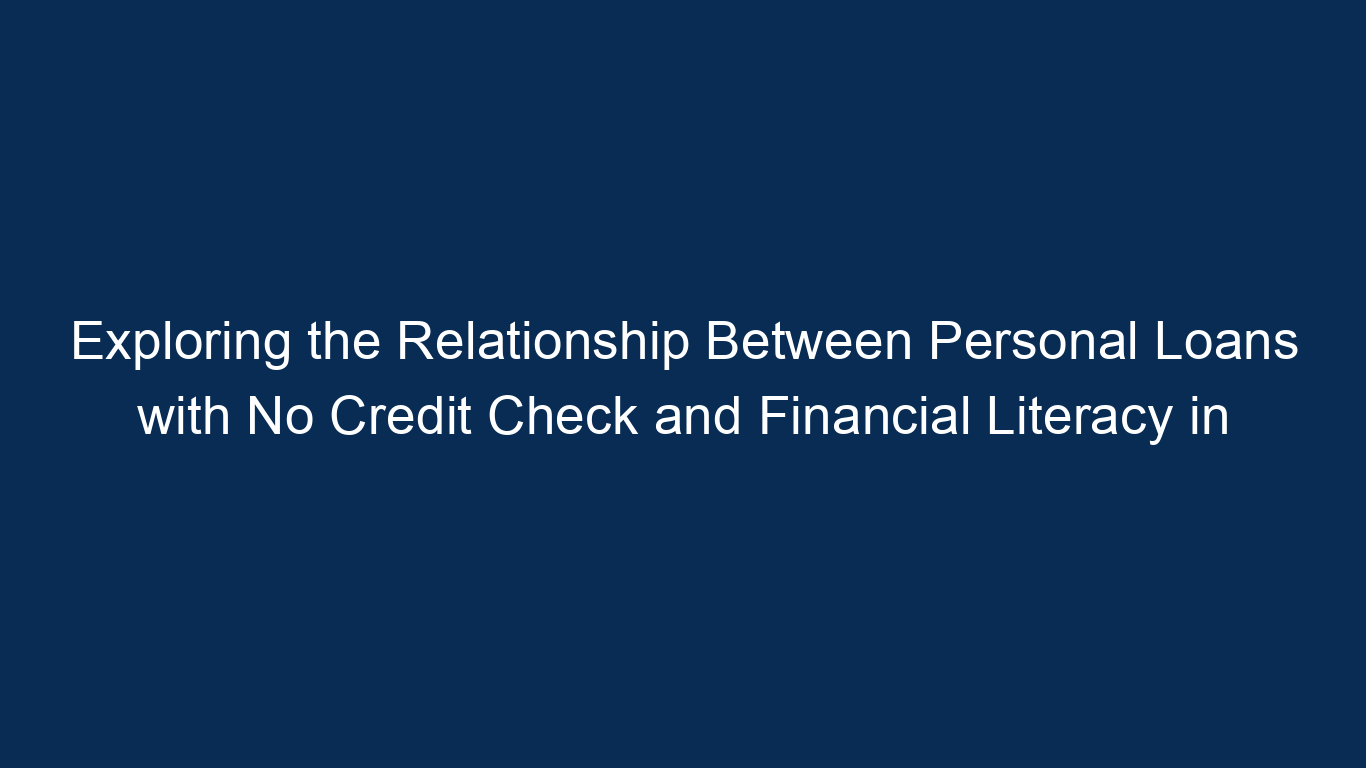In 2024, the financial landscape has undergone significant changes, with personal loans with no credit checks becoming increasingly popular. These loans provide individuals with immediate access to funds without the need for a traditional credit check, making them an attractive option for individuals with poor credit scores or limited credit history. However, this rise in popularity raises concerns about the correlation between personal loans with no credit checks and financial literacy. As more individuals turn to these loans, it becomes crucial to explore the relationship between them and financial literacy to understand the potential consequences and implications for borrowers. This exploration can shed light on the impact of personal loans with no credit checks on individuals’ financial knowledge, decision-making, and overall financial well-being in the years to come.
Table of Contents
- “The Role of Financial Literacy in Securing Personal Loans with No Credit Check”
- “Why Financial Literacy is Essential for Borrowers Seeking Personal Loans with No Credit Check”
- “Exploring the Link Between Financial Literacy and Responsible Borrowing”
- “How Improved Financial Literacy Can Impact the Availability of Personal Loans with No Credit Check in 2024”
“The Role of Financial Literacy in Securing Personal Loans with No Credit Check”
Financial literacy plays a crucial role in securing personal loans with no credit check. Without a solid understanding of personal finance and how credit works, individuals may find it difficult to navigate the loan application process successfully. In this article, we will explore the significance of financial literacy and its impact on obtaining personal loans without a credit check.
Financial literacy refers to the knowledge and skills required to make informed financial decisions. It encompasses various aspects, including budgeting, saving, investing, and understanding credit scores and reports. When it comes to securing personal loans without a credit check, financial literacy becomes particularly important.
Personal loans with no credit check are often sought by individuals who have a limited or poor credit history. Lenders offering these loans do not rely heavily on credit scores to determine eligibility. Instead, they consider other factors, such as income and employment stability. However, this does not mean that financial literacy is irrelevant.
Firstly, financial literacy helps individuals assess their financial situation accurately. It enables them to understand their income, expenses, and debts, which are essential factors considered by lenders. By having a clear picture of their financial health, individuals can determine whether they can afford to take on a personal loan responsibly.
Furthermore, financial literacy helps individuals understand the terms and conditions of personal loans without a credit check. These loans often come with higher interest rates or fees compared to traditional loans. Without financial literacy, individuals may not comprehend the true cost of the loan and the potential impact on their overall financial well-being. They may also miss important details, such as repayment schedules or penalties for late payments.
Additionally, financial literacy empowers individuals to explore alternative options or negotiate better loan terms. With knowledge of personal finance, individuals can evaluate whether a personal loan without a credit check is the best solution for their needs. They may discover alternative sources of funding, such as borrowing from friends or family, or find lenders that offer more favorable terms based on their specific circumstances.
Finally, financial literacy helps individuals build and improve their credit history. While personal loans without a credit check do not directly impact credit scores, responsible repayment can still contribute to a positive credit history. Financial literacy educates individuals on the importance of timely payments and responsible borrowing, which can lay the foundation for future financial success.
In conclusion, financial literacy plays a vital role in securing personal loans without a credit check. It enables individuals to assess their financial situation accurately, understand loan terms and conditions, explore alternative options, and build a positive credit history. By acquiring financial literacy skills, individuals increase their chances of obtaining personal loans without a credit check successfully.
“Why Financial Literacy is Essential for Borrowers Seeking Personal Loans with No Credit Check”
Financial literacy is crucial for individuals looking to secure personal loans with no credit check. Understanding how personal loans work and the potential risks involved is essential for responsible borrowing. This article will delve into why financial literacy is so important for borrowers seeking such loans.
First and foremost, financial literacy enables borrowers to make informed decisions. By understanding the terms and conditions of personal loans, individuals can evaluate whether a loan is suitable for their needs and financial situation. They can assess the interest rates, repayment terms, and any additional fees associated with the loan. This knowledge empowers borrowers to compare different loan options and choose the most favorable one.
Moreover, financial literacy helps borrowers comprehend the impact of personal loans on their overall financial health. Taking on debt without a clear understanding of the consequences can lead to detrimental outcomes. By being financially literate, borrowers can assess whether they have the means to repay the loan without putting themselves at risk of defaulting. They can also determine if the loan will improve their financial situation or exacerbate existing financial challenges.
Additionally, financial literacy equips borrowers with the knowledge to identify predatory lending practices. Personal loans with no credit check often target individuals with limited credit history or poor credit scores. These borrowers may be vulnerable to lenders who exploit their lack of financial knowledge by charging exorbitant interest rates or including hidden fees. By being financially literate, borrowers can recognize such predatory practices and avoid falling into a debt trap.
Furthermore, financial literacy enables borrowers to develop healthy financial habits. It encourages budgeting, saving, and responsible spending. Understanding the importance of maintaining a good credit score and the impact it has on future borrowing opportunities is crucial. By practicing financial literacy, borrowers can improve their creditworthiness over time, making it easier to secure loans with better terms and conditions in the future.
Lastly, financial literacy promotes long-term financial stability. By equipping borrowers with the necessary knowledge and skills, they can make sound financial decisions not only in the context of personal loans but also in other aspects of their financial lives. This includes managing debt, investing wisely, and planning for retirement. Financially literate individuals are better prepared to navigate the complexities of the financial world and achieve long-term financial security.
In conclusion, financial literacy is vital for individuals seeking personal loans with no credit check. It empowers borrowers to make informed decisions, understand the impact of loans on their financial health, identify predatory lending practices, develop healthy financial habits, and ultimately achieve long-term financial stability. By prioritizing financial literacy, borrowers can make responsible choices and avoid potential pitfalls associated with personal loans.
“Exploring the Link Between Financial Literacy and Responsible Borrowing”
Financial literacy refers to the knowledge and understanding of various financial concepts and tools that enable individuals to make informed decisions regarding their money. Responsible borrowing, on the other hand, entails borrowing money in a way that is sustainable and manageable, ensuring that borrowers are able to repay their debts in a timely manner.
There is a clear link between financial literacy and responsible borrowing, as individuals who are financially literate are more likely to make responsible borrowing decisions. A lack of financial literacy can lead to individuals taking on debt without fully understanding the terms and consequences, resulting in financial difficulties and potential long-term repercussions.
When individuals are financially literate, they possess the necessary skills to evaluate their borrowing options, including interest rates, repayment terms, and potential risks. They are able to compare different borrowing products and make an informed decision based on their needs, financial situation, and long-term goals.
Financially literate individuals also have a better understanding of their own financial situation, including their income, expenses, and savings. They are more likely to have a budget in place and to track their spending, which helps them to prioritize their borrowing needs and avoid taking on unnecessary or excessive debt.
Moreover, financial literacy enables individuals to understand the impact of borrowing on their overall financial well-being. They are aware of the potential costs associated with borrowing, such as interest payments and fees, and are able to assess whether the benefits of borrowing outweigh these costs.
In addition, financial literacy equips individuals with the knowledge to manage their debts effectively. They understand the importance of making regular and timely repayments and are more likely to have a plan in place to pay off their debts in a manageable manner. This reduces the risk of falling into a debt spiral or experiencing financial distress.
Financial literacy also helps individuals recognize warning signs of predatory lending practices and avoid falling victim to scams or exploitative borrowing arrangements. They are able to identify red flags, such as excessively high interest rates or hidden fees, and make informed decisions to protect themselves from financial harm.
Overall, financial literacy plays a crucial role in promoting responsible borrowing. By empowering individuals with the knowledge and skills to make informed borrowing decisions, financial literacy contributes to financial well-being, reduces the risk of financial difficulties, and helps individuals achieve their long-term financial goals. Therefore, it is important for individuals to prioritize improving their financial literacy and seek out educational resources and tools to enhance their understanding of personal finance and responsible borrowing.
“How Improved Financial Literacy Can Impact the Availability of Personal Loans with No Credit Check in 2024”
In recent years, there has been a growing demand for personal loans with no credit check. These loans provide individuals with the opportunity to access much-needed funds without the traditional requirement of a credit check. However, the availability of such loans in 2024 may be significantly impacted by the level of financial literacy among consumers.
Financial literacy refers to an individual’s knowledge and understanding of financial concepts, such as budgeting, saving, and managing debt. It plays a crucial role in shaping one’s financial behavior and decision-making. With improved financial literacy, individuals are better equipped to make informed choices regarding their finances, including borrowing options like personal loans.
One of the primary factors that lenders consider when assessing loan applications is the borrower’s credit history. A good credit score indicates a borrower’s reliability and ability to repay debts on time. However, not everyone has a favorable credit score, which can limit their access to traditional loans. This is where personal loans with no credit check come into play.
These loans are designed to cater to individuals with poor or no credit history. They offer an alternative borrowing option for those who may have been denied credit in the past. By not requiring a credit check, lenders consider other factors such as income and employment stability when evaluating loan applications. This means that even individuals with a less-than-perfect credit score may have the opportunity to secure a personal loan.
However, the availability of personal loans with no credit check in 2024 will depend on the level of financial literacy among consumers. Improved financial literacy can positively impact loan availability in several ways:
- Better understanding of financial responsibilities: With enhanced financial literacy, individuals are more likely to understand the importance of managing their finances responsibly. They will be aware of the consequences of defaulting on loan repayments and the impact it can have on their credit history. This increased awareness may lead to more responsible borrowing habits, which can improve the availability of personal loans.
- Improved financial planning: Financial literacy equips individuals with the skills to create and maintain a budget. By understanding their income, expenses, and debt obligations, individuals can better plan for their financial needs, including the potential need for a personal loan. This proactive approach to financial planning can increase the likelihood of loan approval.
- Access to alternative financial resources: Financially literate individuals are more likely to be aware of alternative sources of funding, such as community development financial institutions (CDFIs) or credit unions. These institutions often offer personal loans with more flexible eligibility criteria, including no credit check requirements. By exploring these options, individuals can increase their chances of securing a personal loan.
- Ability to compare loan options: Financial literacy enables individuals to compare different loan products and understand the associated costs and terms. By shopping around and comparing loan offers, borrowers can make informed decisions that best suit their financial situation. This knowledge can help individuals find personal loans with no credit check that have favorable terms and conditions, increasing the overall availability of such loans.
In conclusion, the availability of personal loans with no credit check in 2024 can be significantly influenced by improved financial literacy among consumers. By enhancing their understanding of financial concepts and adopting responsible financial behavior, individuals can increase their chances of accessing these loans. This, in turn, can provide them with the necessary funds to meet their financial needs and goals.
In conclusion, as we look ahead to 2024, it is evident that the relationship between personal loans with no credit check and financial literacy continues to be a crucial aspect of the financial landscape. While personal loans with no credit check may seem like an attractive option for individuals with poor credit or limited financial knowledge, it is important to recognize the potential risks and consequences associated with such loans.
Financial literacy remains key in making informed decisions about personal loans and understanding the implications they may have on one’s overall financial well-being. Without a solid understanding of personal finance and credit management, individuals may fall into a cycle of debt or become vulnerable to predatory lending practices.
Therefore, it is essential for financial institutions, educational institutions, and policymakers to prioritize financial literacy initiatives to equip individuals with the necessary knowledge and skills to make responsible borrowing decisions. By promoting financial literacy, individuals can better evaluate the terms and conditions of personal loans, assess their financial capabilities, and identify alternative options that may be more suitable for their specific needs.
In the years to come, the relationship between personal loans with no credit check and financial literacy will continue to evolve. It is incumbent upon all stakeholders to work together to ensure that individuals have access to the resources and support they need to navigate the complex world of personal finance and make informed decisions that align with their long-term financial goals.






